January 13, 2010, started for me like most mornings.
After coming home from the gym, I peeled off my damp shirt and threw it in the hamper. Returning to the kitchen I took a carton of eggs out of the refrigerator and cracked them one by one into a sizzling pan on the stove. The smell of cheap coffee wafted throughout the apartment as I made my way into the living room and powered up the television hanging idly on the wall. As the screen shook itself awake I returned to the kitchen. Slowly, the audio came to life, and, hunched over three frying eggs, I heard the first hint that my otherwise normal morning was about to take a drastic turn.
“…officials here are stating that initial estimates are that as many as 10,000 people may have been killed in last night’s earthquake, but a quick survey of the scene indicates that it could be many times more that number…“
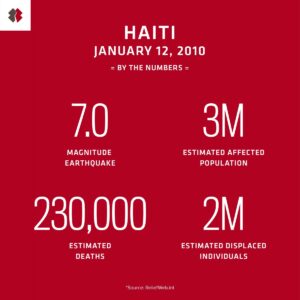
I slid the eggs onto a plate and moved with my mug of coffee over to the couch. Prior to going to bed last night, I read headlines of an earthquake in Haiti—or was it Cuba?—but no news anchors were yet on the ground to report with any accuracy.
Now, as the sun was rising on the West Coast, I watched a reporter sweating in the Haitian sun amid a pile of rubble. He motioned with his arm to the devastation behind him and continued: “Scientists estimate that the earthquake was a magnitude 7.0, with an epicenter just outside the Haitian capital of Port-au-Prince.”
My jaw dropped as I looked at the scene. Every building in the frame appeared to have had a 2,000-pound bomb dropped on it from a close-air support mission. Haitians, their skin covered in chalky white powder, stumbled like zombies through the streets in a daze—an equivalent of war’s thousand-yard stare drawn across their faces.
“…aid organizations throughout the world are mobilizing their response units, but sources say an effective response might take days…”
I watched. At commercial breaks I flipped channels to other news stations, starving for information and updates. Death. Destruction. Hopelessness. Looting. Chaos. Gangs. It was…familiar.
A phone number scrolled along the bottom of the screen. I reached for my phone and, clicking it on, noticed hours had passed. I looked at the eggs and coffee, untouched and long since cooled. I punched in the 10 digits and waited. “…due to heavy call volume…” and then, finally, a voice.
“Yes ma’am. My name is Jake Wood. I just got out of the Marine Corps after four years and two tours. I’d like to go with your organization to Port-au-Prince. I can help you with any number of things and you won’t have to babysit me. I’ve got all my inoculations and can leave immediately.”
“Thank you, sir, but we’re not taking any volunteers right now. If I may direct you to our website where you can make a donation…”
I hung up. A sense of despair enveloped me.
I should do something. I must do something. I had not felt such an impulse since waking up nearly 10 years earlier on September 11, 2001.
Picking up the phone I dialed a number. “What’s up, Wood?,” said the voice on the other end.
“I need to ask you a question. Will you go to Haiti with me?”
Discovering One of Dante’s Circles
Four days later, William McNulty, Jeff Lang, Craig Parello, and I stepped onto Haitian soil after crossing a border checkpoint near Jimani. By then, our numbers had swelled from four to eight, and our caravan of trucks snaked through the congested two-lane highway into Port-au-Prince.
Our senses of sight and smell were not fully prepared for what they found. Moans and wails of agony cut through piles of rubble. The rancid smell of decay and death hung in the air like a putrid mass grave—which Port-au-Prince had just become. Throngs of Haitians, hands outstretched in desperation, mobbed the vehicles. And everywhere a thick, white chalk caked surfaces and whirled in ominous clouds. Haiti, it would seem, had become one of Dante’s circles of hell.
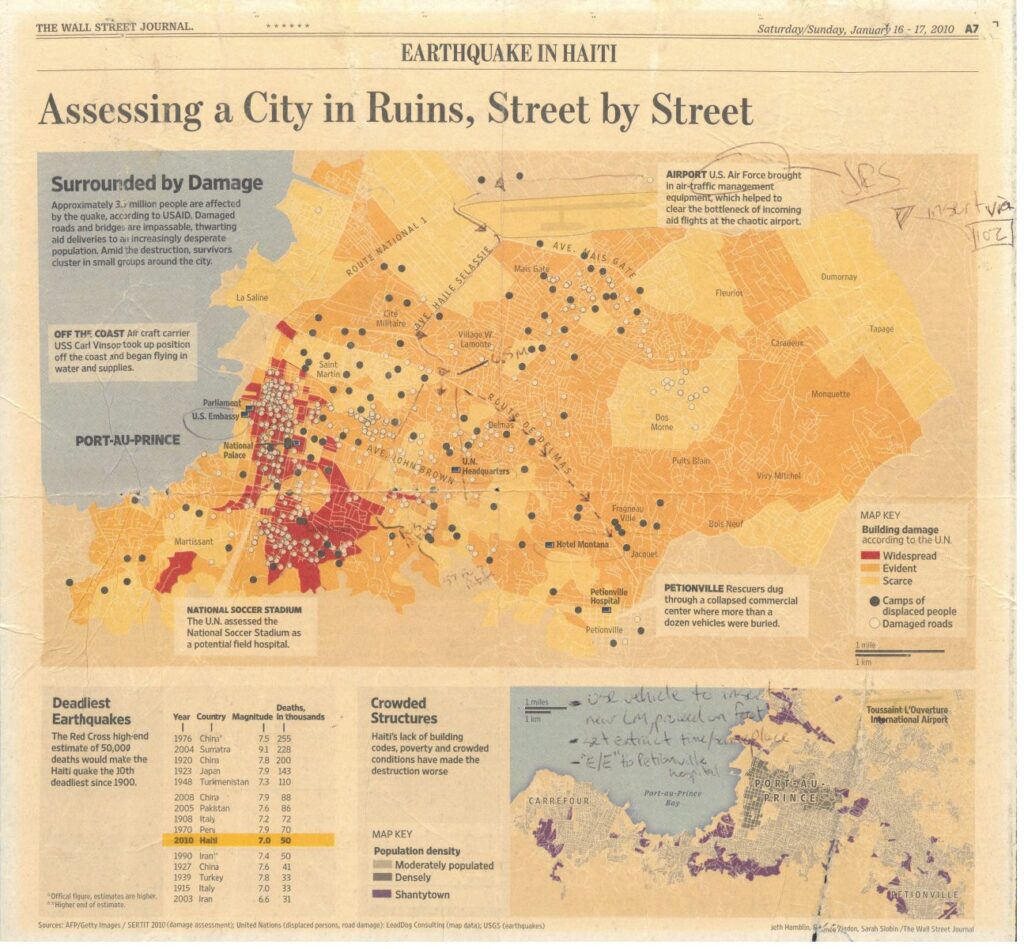
The following dawn brought us to an internally displaced persons camp with several hundred now homeless Haitians. In front of me, a row of anguished faces squirmed in the hot Caribbean sun. Old men, their knees and elbows knobby with age, groaned in pain, revealing dark, toothless mouths. The women were throwing their arms up in the air and praying loudly in Creole, wailing at the clear sky. Scattered between all the legs and torsos were the children, their white eyes shining in stark contrast to their dark faces. Eyes filled with pain. Eyes filled with fear. Some eyes with just the slightest twinge of hope.
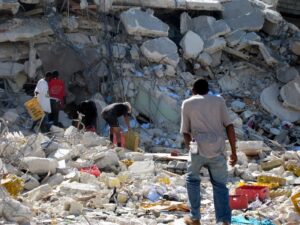
This sea of humanity, desperate for help, crowded toward us. The only thing keeping the peace was a long thin piece of military paracord tied between two tree branches. This thin, olive-green string, completely ordinary to a military veteran, may as well have been an electrified fence to the Haitians on the other side of it. They stared at it, waiting for the moment that we took it down and began the task at hand.
“…So let’s grab our Chlorhex, our gauze, our…” Mark Hayward paused as he looked at the pile of supplies laid out on the poncho. “And that satchel full of silver-sulfadiazine, and let’s move it over here to set up.”
One Small Medical Team, and Countless Survivors
William met Mark while en route to our rally point in the Dominican Republic when Mark leaned across the airport shuttle bus and quietly whispered, “Semper Fi,” in recognition of the camouflage pants William wore. Mark asked William if he was going to Haiti. When William replied he was headed down with a group of Marines, Mark introduced himself as a former Army Special Forces Medic with experience in Haiti in need of a team of guys he could trust. Mark instantly became the fifth, and perhaps most important, member of Team Rubicon.
Realizing it was time to get to work, I reached into my cargo pocket and extracted a pair of latex gloves. We’d added three helpers to our team from the Novitiate, and they were now beginning to do their job of herding the most grievously wounded into the makeshift triage area we set up.
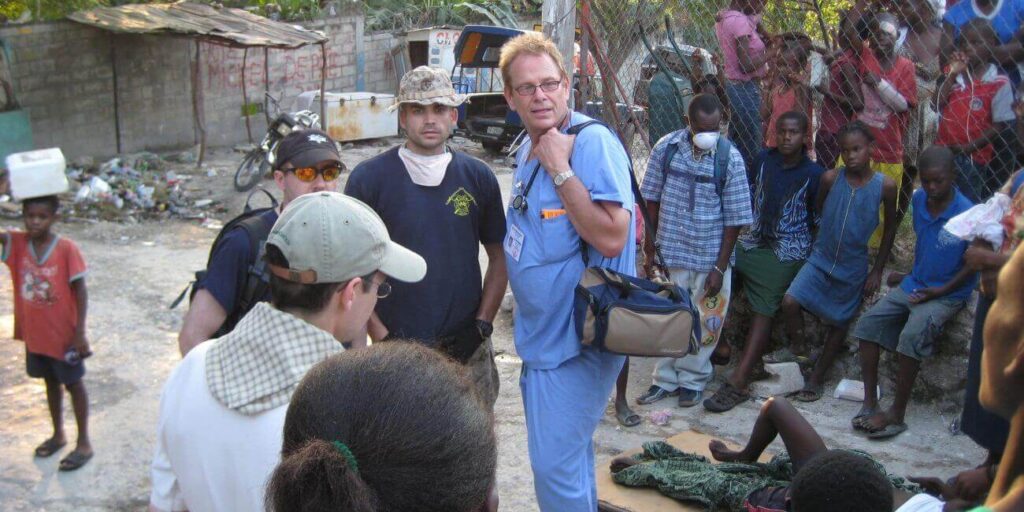
I walked over to a plastic chair that had likely been scavenged after the quake and knelt before it. Leaning forward I aligned and realigned the rows of gauze, disinfectant, and bandages that made up my cache of materials. I looked up and beckoned the first person forward. Aided by two men, a woman hobbled toward me, breathing heavily and wincing in agony with every step. She had sustained visible trauma to her right leg and, as she approached, I nodded my head and smiled at her, motioning for her to take a seat. Overweight, I secretly prayed she would not collapse the flimsy chair. I stood to help the two men lower her down. Once set, I returned to my knee and looked at her leg.
I wasn’t a doctor, but what I saw, I had seen before. A massive piece of flesh had been torn off her lower leg, revealing tissue, muscle, and bone. This, I was familiar with. Gingerly placing my fingertips around the wound, I began probing, switching my eyes back and forth from the wound to her eyes, judging her reaction to every touch. The exposed bone was not visibly broken, but there was an inexplicable lump just below the wound that could be nothing but a compound fracture. Knowing that I would need to bring either Mark or one of the doctors in to set the break, I removed my hands and picked up a bottle of Chlorhexidine disinfectant.
With the bottle of chlorhex in one hand and a piece of gauze in the other, I looked up at her and said in a calm voice, “Miss, this going to hurt, okay? I’m going to be as gentle as I can, but it is going to hurt really, really bad.”
Holding the hands of the men who helped carry her over, she looked up at them with confusion. “Pain,” I said, “You are going to have lots of pain.”
Still breathing rapidly out of fear, she nodded her head, muttering something between shallow breaths. Satisfied that she understood, I squeezed the bottle of chlorhex generously into the wound.
The woman leaned back in the chair and howled.
“Be strong, I need you to be strong,” I said, trying to be heard over her shriek. With gauze in my right hand, I reached down and began scrubbing away the dirt and gravel and puss occupying the wound. With every stroke of the gauze her screams rose until, finally, one of the men pulled her face into his chest and buried her screams in his tattered shirt. Back and forth I went. Chlorhex. Scrub. Chlorhex. Scrub. I cleaned her wound until her screams became sobs and I was satisfied that she would not die or lose her leg from infection.
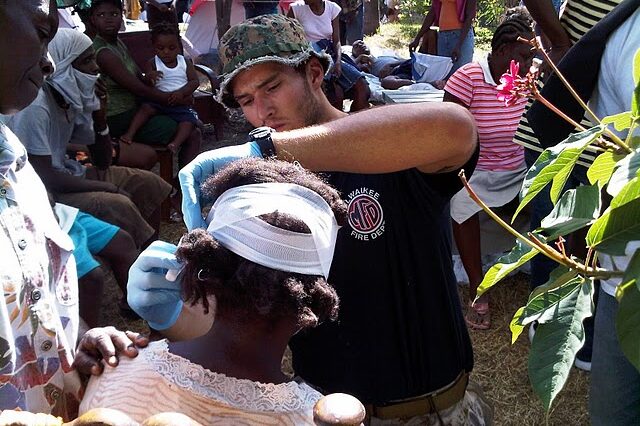
“Hey, Mark!” I hollered over my shoulder. I heard Hayward’s reply somewhere behind me, obviously preoccupied. “I have what looks like a tib/fib fracture over here. I need you to set it when you get a chance.”
“I’ll be right over there. Gotta finish this amputated hand first.”
Holy shit, I thought to myself. We had been at Manresa for only 30 minutes, and people were coming in like the wounded at Gettysburg.
I stood up to search for casting material and felt one of the men grab me on the arm. “Merci, merci,” he said, stroking the woman’s hair and holding her weeping head in his chest.
“It’s not over yet, my friend,” I said, knowing that the woman’s worst pain was yet to come.
I gathered up some make-shift casting supplies and made a pile near the woman’s foot. Our group had limited supplies to begin with and appropriate casting material, which was one of our most crucial items, was nonexistent. The pile I made consisted of a piece of window frame, which someone took the time to flatten the nails on, and a few rolls of bandages.
Finding another open chair, I again knelt in front of it. Going through the same ritual, I aligned and realigned the gauze, chlorhexidine, and bandages into neat little rows, each label facing the same way. Finally, without looking up, I raised my arm and beckoned the next patient forward. I continued to rotate bandages on the ground until two old, crusty feet stepped under my field of view and sat in the chair. The feet, cracked and weathered from years of walking barefoot along the rough streets of Port-au-Prince, belonged to an old man, the whites of his eyes yellowed from years under the sun. The man said nothing, he simply looked down to the bundle in his arms. I followed his gaze and locked eyes with a terrified little boy, his small little hands balled up into fists underneath his chin.
“Hey there little guy, how ya doin’?” It was a stupid question to ask five days after one of the world’s worst disasters. I reached out and grabbed his forearm. “What’s wrong with you tough guy? Can I have a look?” I turned to the old man, who I assumed was his grandfather. It left me wondering whether the kid’s parents were buried under a mountain of rubble somewhere. My eyes sought the man’s approval and finally received it, as he shifted the boy around in his arms to reveal his other leg, which was bandaged in a motor oil-stained rag. I could already see yellow puss seeping through amid the bloodstains. Not wanting to unnerve either the kid or the old man, I put on a strong face and said, “Let’s have a look. I’m sure we’ll get you cleaned right up.”
A Baby? In This?
I reached my hands out to begin undressing the wound, but the kid jerked around and buried himself into his grandfather’s armpit. I gave up on the wound and soothed the young boy, alternating between squeezing his forearm gently and placing my hand on his head. Knowing every minute counted, I looked nervously at the long line of critically injured patients lined up behind the chair. Finally, with the old man’s coaxing, the child turned back and nodded his tacit approval with a quivering lower lip.
“Alright, I’ll be gentle, I promise.”
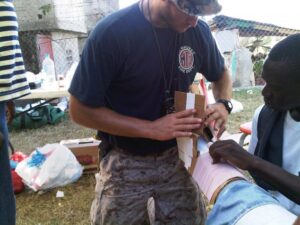
With great care, I untied the amateur knot and slowly unwrapped the child’s leg. The stain of yellow puss expanded as each layer was removed until, finally, the wound itself was revealed. For a moment I hesitated, unsure how to react. The kid had a hole straight through his leg and it was steadily oozing multicolored puss. If he hadn’t already contracted staph, he was probably only hours away. Smiling, I gently slapped him on the shoulder and pointed to the hole. “That little thing? That’s what you’re crying about? Come on kiddo, I thought you were tougher than that. We’ll get this thing cleaned right up and I promise you’ll be out playing soccer again in no time.”
I pointed to my chest, “My name is Jake. J-A-K-E. Jake, can you say that?” The kid didn’t so much as blink. “What’s your name,” I asked, pointing to his chest. Nothing. Pointing back to myself I repeated my name. Finally, the child’s lips moved and an inaudible sound escaped. It wasn’t Jake, but it was an acknowledgment of our newfound friendship. I pressed on. “I was a Marine. Marines are tough. I bet one day because you’re so tough, you can be a Marine.” I let the offer hang. “But, I need you to prove how tough you are for me. I’m going to squeeze all this nasty puss out of your leg, and I need you to be a strong boy and let me do it, okay?”
I looked to the grandfather for permission to begin. He tightened his squeeze on the boy and nodded his head. I reached up with both gloved hands and grabbed the child’s thigh. My fingers nearly wrapped all the way around and touched my palms. Placing my thumbs just below the wound, I clenched my teeth as if I were the one about to feel the pain. “One…two… three…” I squeezed my thumbs inward. A river of puss and blood streamed from the hole, trickling down the boy’s leg and onto the old man holding him.
The child screamed.
“It’s okay, it’s okay. It’s going to be over soon.” But it wasn’t over. I squeezed again.
Again, the child screamed.
I squeezed again. The river of puss began to wane.
The screaming continued, and when I finally looked the boy in the eyes I saw fear, pain, and betrayal. Betrayal because I was Jake, and I was there to help him, not hurt him. I motioned for the man to stay put, and I stood up, ripping off the latex gloves. Looking around behind me, I found Mark and made my way over to him.
“Mark? Hey Mark, do we have any local anesthetics we can stick this kid I’m working on with? Looks like he fell and drove a rusty spike all the way through his legs, and I was hoping to numb him up before I start probing and cleaning it.”
Mark turned on a knee to face me, revealing the patient he was working on. It was a middle-aged man, whose calm, cool demeanor belied the horrific wound at the end of his forearm. I struggled to maintain composure while looking at the man’s bloated hand, skin shorn off, missing three fingers and half the palm. It was as if it had been placed down a garbage disposal and then inflated with a pump. I quickly turned my eyes to Mark. Mark’s eyes captured mine and locked them in so I didn’t look back at the hand and cause the man to panic.
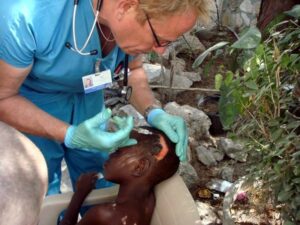
“I saw some Lidocaine in one of the bags, but we don’t have much.” He raised his forearm up to his forehead and wiped the sweat away from his eyes, careful to keep the bloody gauze he was holding from touching skin. “Let me ask you this, is the boy going to lose his leg?”
“I don’t think so. I think I’ll be able to get it under control and keep the infection away.”
“Then I’m sorry, the kid’s going to have to deal with the pain.” I nodded my head. “Do me a favor though, make sure Doc Griswell checks him out before you send him off.”
“Roger that, boss,” I said.
“You’re the boss Jake, I’m just the medic,” Mark said, jokingly offering a salute with a gloved hand. I turned and began walking over to the pile of supplies, realizing halfway there that I had not seen Doc Griswell since we’d started seeing patients.
Looking over my shoulder, I yelled back to Mark, “Hey Mark, where is Griz?”
“Delivering a baby somewhere.”
I thought silently to myself. A baby? In this? Even if it were delivered alive, would it live to see February? I stopped and slowly spun in a circle, scanning the area for Griswell. Finally, off to the side, I spotted him. He was facing away from me on his hands and knees in the shade of the only trees around. His baby blue hospital scrubs were outlined by two legs, split wide open in the air. Doc Gris was delivering a baby, the mother lying flat on a dislodged wooden door repurposed as a hospital bed. I closed my eyes and said a quick prayer. A prayer that the mother and the child would survive and that, somehow, they would escape Manresa, and Port-au-Prince, and Haiti altogether.
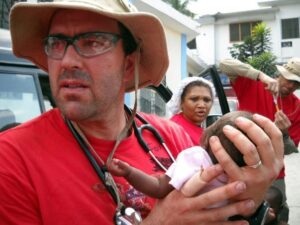
I opened my eyes and walked over to the pile of supplies. Brother Jim was already there, rummaging through the different piles in search of something specific. Looking up he smiled.
“Welcome to Haiti my friend,” he said. I laughed. “How are you doing? You good?”
“Yeah, I’m good Brother Jim. Thanks. You?”
“Can’t say I’ve ever seen anything like this before, but I’m good,” Jim said. “I’ll make sure we send some interpreters on a beer run later so we can unwind and reflect.”
My mouth watered instantly. “Jim, you’re beginning to make me think you were a Marine in a prior life.”
“Jesuits aren’t saints, Jake,” Jim said with a devilish grin. We both laughed, a moment that separated us from the world around us. “Alright,” Jim said, clapping his hands, “back to work. The beer can wait.”
Digging into the pile, I found a box of sterile cotton probes. Grabbing the supplies I walked back over to the young boy. As I stood over them my mind flashed back to Afghanistan—to the little boy who came in with the gunshot wound. How long ago had that been? Eighteen months? That war, at this moment, seemed a lifetime away, but the scene before me may as well have been the same.
I reached into my cargo pocket and grabbed a bottle of water, offering it to the kid. The child looked cautiously at his grandfather, who smiled and nodded his head in permission. Reaching out with both hands, the child grabbed the bottle and brought it up to his dry, chapped lips. The water poured out of the bottle and into his mouth and down into his tiny belly and, for the first time in five days the kid drank without fear of where his next drink would come from.
“Everything’s gonna be alright,” I said, patting his head. While the child continued to drink I put a new pair of gloves on my hands and ripped open a cotton swab. Reaching up, I began working on his leg.
There Was This Boy…
Later that night, Brother Jim sat us in a circle at our camp. Doctor Griswell miraculously produced a bottle of Hendricks gin, while our interpreters returned with cardboard boxes filled with Presidente beer. Taking a bottle of beer, I looked around for an opener. It took only seconds to remember where I was and I looked to improvise. As I had done countless times over the previous year, I reached down and pulled off the killed-in-action memorial bracelet I wore on my right wrist. On it was inscribed the names of four Marines I’d lost overseas—Howey and Windsor in Iraq, Washington and Crass in Afghanistan. Placing the steel bracelet between my thumb and bottle, I deftly popped off the cap and took a long, deep swig of Caribbean beer.
“I want to ask everyone to take a moment and reflect on what happened today,” Brother Jim said. “We just spent 10 hours in perhaps the worst situation imaginable, and the images you saw today will be seared into your memory for the rest of your lives. It’s important for us to talk about them. Some of you will want to share bad memories, some of you good ones. Regardless, I’d ask that you share them.”
Silently, we all nodded.

“I’ll begin. First, however, I want to get something off my chest. I must admit that I’ve never been a big fan of the U.S. Military. In fact, when my bosses in Chicago told me to meet a bunch of former Marines in the Dominican and lead them over here, I was skeptical. I want you to know I now realize I’ve not always been fair to you or your brothers and sisters. In fact, a few years ago I protested outside of a U.S. military base, denouncing the war and all of you as criminals. Today, I learned something, though. I learned you are incredible human beings. I learned Jesuits don’t know everything there is to know about service and sacrifice. I learned each of you would have died for me and for one another today. I can’t undo what I did all those years ago outside your base, but I can promise you this—I will never again protest our military nor speak ill of them. For teaching me that lesson in humility today, I thank you.”
Brother Jim went on to talk about what had impacted him that morning in Manresa, and slowly, one by one, the group went around the circle and talked about their experience.
As I sat there listening to the group, my mind drifted back to the young boy. He had been so similar to the Pashtun boy I’d worked on a year and a half prior in the Helmand Valley. The wounds the same, their ages and size as well. That boy in Afghanistan had impacted me greatly. He’d been brought to our small forward operating base along with about a dozen other wounded Afghans, most of them children. They’d been hurt when the local Taliban randomly opened fire in a market.
As I sat there listening to the group, my mind drifted back to the young boy. He had been so similar to the Pashtun boy I’d worked on a year and a half prior in the Helmand Valley. The wounds the same, their ages and size as well.
He’d been so innocent. Innocent and strong, as he laid there steadfast in the sun, holding my hand as a British medic worked on the gunshot wound through his leg. That day had a profound impact on me. I’d been in Afghanistan for six months on a six-man scout-sniper team and unspeakable violence was all around. My life at times felt consumed by it. Not wanting the war to define who I was, I chose to leave the Marine Corps at the end of my tour.
Three months after that decision I was in Port-au-Prince. Perhaps I hadn’t escaped the death and chaos, but at least the war was in the rear-view mirror. Besides, the day had felt strangely…good. Or pure, rather. There was a purity to our motives and actions that felt right. The images would no doubt stay with me forever, but that seemed okay.
My thoughts were interrupted when I realized the circle was silent. William had just finished speaking next to me and now the group waited to hear my reflection. I smiled apologetically. With another swig of beer I stared at the ground and cleared my throat. “There was this boy today…”
The Start of Team Rubicon
That was the beginning of Team Rubicon, at least from my individual perspective. That night, though we were calling ourselves Team Rubicon, we had no foresight into what our small team would become. A few days later, William would grab me after a long day in the field and pose the question—“So what’s next?” Admittedly, I hadn’t thought about it. I was living in the moment, every hour full of complexity and challenge.
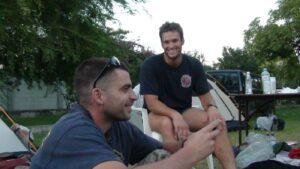
We had the initial conversation then, about what to do with this idea we’d stumbled on. Do we just let it be? Wash our hands of Port-au-Prince, proud of the work we’d done, and go back to the lives we’d charted for ourselves? Or do we build upon this idea, try to improve disaster response by bringing the skills of military veterans to bear?
Of course, we chose the latter, but the trajectory of Team Rubicon wasn’t quite yet set. It took us another year to realize the importance of what we’d built. You see, anyone could have seen the positive implications of using military veterans for disaster response. The concept was so elegantly simple. It was the power of that service on the veterans themselves that has made Team Rubicon truly special.
This story was first published by Jake Wood on LinkedIn in 2019.



